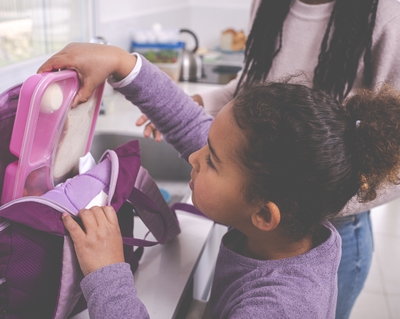
This Clinic’s Individualized Support Is Helping Kids Build Fit And Healthy Futures
(Novant Health, Patrick Flanary) — Stigma and weight bias persist for kids with obesity, a chronic disease that affects one in five children and adolescents in the United States.
Around the world about 160 million children live with obesity, which is caused by several genetic, environmental and socioeconomic factors – rather than solely on one’s diet.
But misconceptions often fuel bullying that can lead to even worse health outcomes for kids, including disordered eating, poor body image and isolation from physical and social activity.
“Many people still think of obesity as a personal or parental failure, and it truly is not,” said Carolanne Majeski, a family nurse practitioner who works in pediatric endocrinology and leads the Novant Health Youth Health and Wellness Clinic in Wilmington. “People want to be healthier, and it’s often very difficult for people with obesity to reach a healthy body mass index (BMI) without a lot of support.”
That support, offered at Novant Health Nunnelee Pediatric Multispecialty Care – Autumn Hall, includes services for toddlers through college age. Since 2023, the clinic has helped families in southeastern North Carolina work with trusted allies to address weight management in a safe space.
The program treats children diagnosed with Class 2 obesity (a BMI at or above 120% of the 95th percentile) who have additional medical conditions like high cholesterol, elevated liver enzymes or depression. (Your pediatrician or family medicine doctor can help with most concerns related to health issues where weight management may be an underlying factor and can make a referral.)
Majeski’s team includes registered dietician Ashley Gousios and medical assistant Morgan Dunleavy, whose treatment methods include personalized exercise and nutrition guidance, medication and counseling. Patients 13 and older are evaluated for bariatric surgery, per American Academy of Pediatrics guidelines.
Here, Majeski addresses how a healthier childhood can set kids up for a healthier adulthood.
What health risks are associated with children and adolescents with obesity?
We are seeing more children with type 2 diabetes, which used to be a disease experienced in middle age. It can affect how multiple organs function, including the eyes and kidneys. Some of the children I treat have liver disease, high cholesterol and high blood pressure.
It makes sense to treat this now so that kids can grow up to live healthy lives. If lifestyle changes aren’t producing the results they want, FDA-approved treatments and medications for children age 12 and older can help improve blood sugar, liver function and blood pressure.
How should parents broach the topic of weight with their kids, and what’s the best time to start that conversation?
It’s a really tough thing for families to talk about, so we try to be as sensitive as we can to make it a good experience. Healthy growth, including weight, should be initially discussed during yearly visits with your pediatrician, who assesses whether your child is approaching an unhealthy BMI and can refer them to our program.
Because there are many causes of abnormal weight gain, the first visit allows us to conduct a comprehensive history. We assess depression, anxiety, eating disorders and genetic causes. We also do lab work to be sure there aren’t any endocrine or other medical causes for weight gain. The best approach comes from education.
How active should parents be throughout this wellness program?
We’re working to encourage families to adopt a healthier lifestyle. For all of us, there’s some room for improvement and it does not have to be perfect. You don’t have to go from zero to 60, and you don’t have to give everything up. There should not be restrictions where you’re telling your child that they can never have dessert again. When something becomes too restrictive, it typically doesn’t work, and that’s when kids may develop unhealthy reactions like hiding food, binging or feeling shame.
We might ask a preteen or teenager how difficult it would be to decrease their soda consumption, then come up with a plan for how they can replace soda with water. So it’s not so much telling them what they need to do. It’s more about having a back-and-forth conversation and reaching an agreement.
How is each child treated as an individual?
Kids are embarrassed to talk about weight, so we approach that conversation in a different way. We make a point of getting to know each person and what their goals are. We ask what they enjoy doing, what they like or dislike about school, and how they feel about their health and their bodies.
We find ways to encourage physical activity. That might mean sending a child home with resistance bands or teaching them how to jump rope if they either don’t have the means to join a gym or feel self-conscious about working out in front of others.
What does a successful outcome for a kid at the Youth Health and Wellness Clinic look like?
Small changes accumulate over time. For patients who have graduated from the program, their lab work has improved, their BMI has reached a healthy zone and they’re feeling good.
They have the tools they need and may still benefit from medication and working with a dietician, physical therapist or personal trainer. People are willing to stick with the program because they’re not on this journey alone.
5 tips to help children make healthy changes

1. Make a variety of veggies the norm.
It’s normal and healthy for kids to eat every few hours. Offer a variety of fruits and vegetables throughout the day. Get your kids involved by asking them to pick out a new veggie at the grocery store each week.
Frozen and canned fruits and vegetables are often less expensive than fresh and are still good for you. Look for low sodium or no-salt-added vegetables and fruits packed in 100% fruit juice.
Try out fun ways of eating fruits and veggies, such as cutting them into chip shapes and serving them with dip or threading them onto skewers.
Beverages are important, too. Help kids rethink their drink by replacing sugary drinks, such as soda, fruit drinks and flavored milk, with water or plain low-fat milk.
2. Move more as a family.
Physically active youth have stronger muscles and bones, better cardiovascular fitness and lower body fat than those who are inactive. Children ages 3 to 5 years should be physically active throughout the day. Children ages 6 to 17 years need at least 60 minutes of physical activity every day.
Help your children move more and meet the physical activity recommendations by making it a family affair. Walking the family pet before and after school, riding bikes and having races in the yard all count toward physical activity. Active chores, such as washing the car, vacuuming a room or raking leaves, also count.
Older kids might be motivated by exercise with purpose, such as starting a neighborhood dog-walking or lawn-mowing business.
It’s important for all kids to be physically active. You can learn more here about special considerations for children and adolescents with disabilities.
3. Set consistent sleep routines.
Good sleep helps prevent type 2 diabetes, obesity, injuries and problems with attention and behavior. Children who don’t get enough sleep are at risk for weight gain. Researchers are still trying to learn how sleep is linked to weight gain. Some reasons might include that lack of sleep can cause a child to eat more or to be less physically active because of low energy.
4. Replace some screen time with play time.
Reducing screen time can free up time for activities and also remove over-snacking cues.
Turning off screens an hour before bed and removing screens from children’s bedrooms can help reduce screen time and improve sleep. The American Academy of Pediatrics recommends creating a family media plan to create clear and consistent media guidelines for each family member.
5. Get rid of the “clean-plate club.”
Help kids honor their own hunger cues by encouraging them to eat until they are satisfied, not until their plate is clean. It’s healthy for kids to learn that leaving some food behind when they’re full is OK. (And if you are concerned about food waste, you can always put leftovers in the fridge for later.)
Pediatric specialty care in your neighborhood
Novant Health is committed to increasing access to pediatric specialty care in Wilmington, and welcomed several new children’s specialists to their team in 2022 to serve the coastal community. This commitment is part of Novant Health’s expanded partnership with University of North Carolina Health, and it allows parents to seek care for their children closer to home, with less travel and shorter wait times.
You’ll find new and expanded children’s services in Wilmington at Novant Health Nunnelee Pediatric Multispecialty Care – Autumn Hall and Novant Health Betty H. Cameron Women’s & Children’s Hospital.
